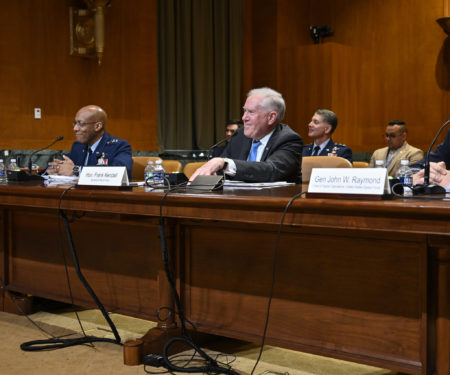Radar Sweep
OPINION: Is America’s Military Headed Down the Same Path as Russia’s?
“Russian President Vladimir Putin’s failure to rapidly defeat a much smaller foe is not just a failure of strategy, but an overestimation of his military’s capability, training and prowess. U.S. leaders need to take a hard look in the mirror and question whether we are treading similar ground with a set of military capabilities too small and too old given current threats,” writes retired Lt. Gen. David A. Deptula, dean of the Mitchell Institute for Aerospace Studies.
Truck Exhaust, IT Woes, and Piles of Rubble: Offutt Faces Uphill Battle to Rebuild
The floodwaters that swallowed around one-third of this base in suburban Omaha are long gone. But three years later, Offutt’s Airmen are still fighting to stay afloat. Most employees have not returned to their former workspaces, some of which were freshly renovated before the flood hit in March 2019. It will be several more years before they can move back into offices that promise to be better than what they lost.
Pentagon Officials Testify at First Public UFO Hearing in More Than 50 years
A House panel held the first public congressional hearing on unidentified flying objects in more than half a century May 17, with top Pentagon officials saying the number of "unidentified aerial phenomena" (UAP) reported by pilots and service members had grown to about 400. Undersecretary of Defense for Intelligence and Security Ronald Moultrie and Deputy Director of Naval Intelligence Scott Bray testified before a House subcommittee about how the Defense Department is organizing reports of UAPs after a congressionally mandated report released last year found most of the incidents analyzed remain unidentified.
Pentagon Finds No Fault in Syria Airstrike That Killed Women and Children
A U.S. military commander who ordered a 2019 airstrike in Syria that reportedly killed as many as 70 civilians did not violate the laws of war or engagement, according to an independent review by a four-star general. There was also no effort to cover up the strike in Baghuz, along the border with Iraq, that happened during a counterattack by the Islamic State group against the U.S.-allied Syrian Democratic Forces, Army Gen. Michael Garrett found in his review. The incident and number of civilian casualties were first reported by The New York Times.
Space Force Targets 2027 for Resilient On-Orbit Posture Initial Capability
The Space Force’s investment in new space systems designed to provide greater resiliency against adversary attack will begin to show results in 2027, Chief of Space Operations Gen. John W. "Jay" Raymond told lawmakers. In testimony on the service’s fiscal 2023 budget request before the Senate Appropriations defense subcommittee, Raymond explained that the satellites in the current national security satellite system are “very few in numbers, and they’re not very defendable.”
‘That Still Needs Further Development’: SOCOM Leaders Want More Layered Airborne ISR
U.S. Special Operations Command is looking to beef up its airborne intelligence, surveillance, and reconnaissance capabilities as it moves away from counterterrorism operations and toward potential conflicts against a near-peer adversary. At the Special Operations Forces Industry Conference, several SOCOM leaders called out the need for sustained investment in new overhead ISR capabilities that will give special operators better situational awareness in the future.
China, US Are Racing to Make Billions From Mining the Moon's Minerals
“There’s going to be a new world order out there, and we’ve got to lead it,” President Joe Biden said after Russia’s war in Ukraine upended global geopolitics. Far from Earth, that transition is already happening. Just like in the era of Sputnik and Apollo more than half a century ago, world leaders are again racing to achieve dominance in outer space. But there’s one big difference: Whereas the U.S. and the Soviet Union hashed out a common set of rules at the United Nations, this time around the world’s top superpowers can’t even agree on basic principles to govern the next generation of space activity.
Military Experiment Demonstrates Intersatellite Laser Communications in Low Earth Orbit
Two small satellites launched last summer by the Defense Advanced Research Projects Agency successfully established an optical link during a nearly 40-minute test, according to CACI International, the supplier of the optical terminals. More than 200 gigabits of data were transmitted and received over a distance of about 100 kilometers, the company said. Optical terminals use lasers to connect satellites in orbit so they can transfer data in space.
Did America Just Miss Its Chance to Help Build Japan’s Future Fighter?
Reports in the Japanese media suggest that Tokyo is thinking about teaming up with the United Kingdom, not the United States, to help build its next-generation combat aircraft, known as the F-X. Apparently, BAE Systems has been earmarked as the most likely partner for the program, which aims to field a new fighter jet around 2035, the same timeline as for the British company’s Tempest Future Combat Air System.
Bright Spot: Tuskegee Airman Receives Thousands of Birthday Cards
A man believed to be Rhode Island’s last surviving member of the Tuskegee Airmen turns 100 years old this month, and he asked for birthday cards. Since then, thousands of cards have poured into retired Sgt. Victor Butler’s home in Cranston, R.I. “People are very, very nice. Counting the cards is amazing,” said Victor’s wife, Senora.



